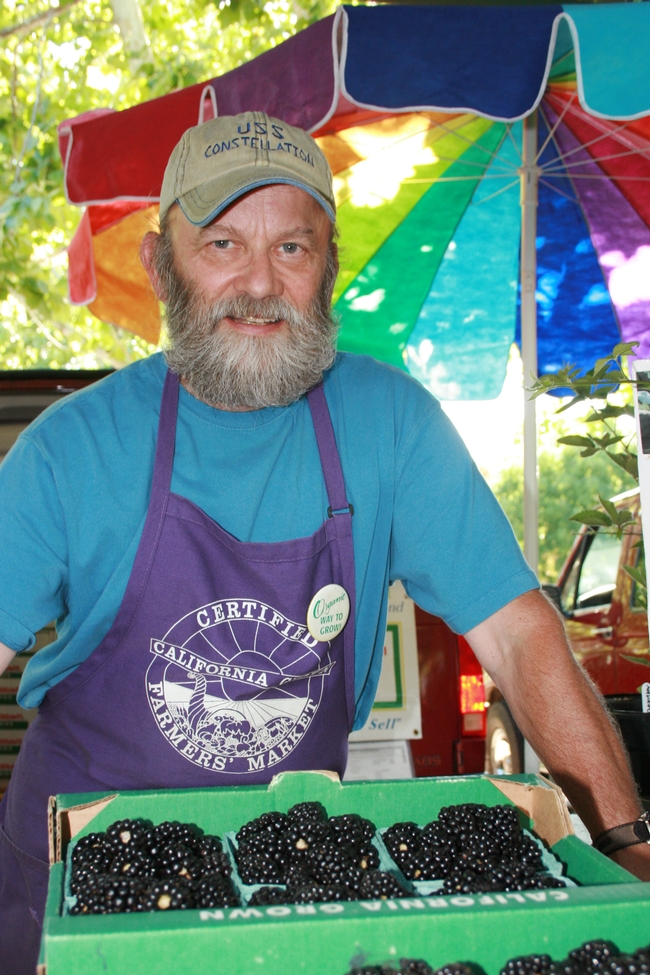Posts Tagged: social media
One more way to 'know your farmer'
A ranch dog "friended" me on Facebook the other day. Yep, a dog on Facebook. To be specific, this is a working dog on a ranch that produces meat and sells it directly to consumers like me.
Apparently when Suki isn't herding cows at Scott River Ranch, she's surfing the web.
And exactly how is a ranch dog on Facebook related to food?
More and more people are interested in connecting with farmers and ranchers who produce the food we eat.
If you buy fresh produce at a farmers market, you can also ask farmers (or their employees) questions about which variety is ripest right now, how the produce was grown, how the meat was processed, and what the farm is like. Proactive eaters can sign up for CSA harvest boxes to receive seasonal produce, know exactly who is growing their food, and pledge support to a particular farm or group of farms. We can visit farms to participate in agritourism by buying from farm stands, taking ranch tours and even getting into the fields to harvest "U-pick" berries and other fruit.
"Local is hot" was on one of the opening slides of Kathleen Merrigan's presentation at UC Davis last week. The USDA's deputy secretary was visiting campuses to discuss the agency's "Know Your Farmer, Know Your Food" campaign, which focuses on local and regional food system support.
And now we have another way to know a farmer, without even leaving the office: Anyone can like their favorite farmers on Facebook, follow them on Twitter, subscribe to their blogs, sign up for their email newsletters, and more.
Hearing about Suki the ranch dog's antics, with photos of her bathing in a water trough or videos of her chasing a field's pivot sprinklers, is another way for consumers to get a glimpse of ranch life from behind the scenes. Likewise, hearing from a farmer on Facebook about how today's rain might affect the cherry harvest is another way for me to feel connected with the farmer who is raising food I will soon be eating.
Chris Kerston of Chaffin Orchards put it this way: "If I'm walking along the field and I see a weird-looking bug, I'm going to stop, take a picture of it with my phone, put it on Facebook and ask 'Anyone know what this weird bug is?' ... It's just another way for people to see what it's like out on the farm."
Don't take it just from me: National companies are taking notice too. This month the editorial board of The Packer, a newspaper that specializes in the fresh produce industry, suggested that local is also about something else:
"While some national suppliers may look skeptically at the buy local trend, a component of local is consumers’ need to connect with where their food comes from.
"Social media is often the solution."
You can connect with the farmers and ranchers who produce your food — whether you buy it at a farmers market or in a supermarket — and receive updates from the farm or ranch through social media.
You can start by asking your favorite farmers or ranchers if they're on Facebook, and here are a few other networks for finding farmers online:
- Know A California Farmer is a website that shares updates, blog posts and videos from participating farmers and ranchers.
- Find farms near you with the Local Harvest directory and see if they are online too.
- I also maintain a list of California farmers and ranchers on Twitter.
Join the discussion: So, what would you like to know from the people who grow and raise the food you eat?
Bonus video: Connecting with social media goes both ways; farmers want to connect with consumers who buy and eat their products. Staff and academics with UC Cooperative Extension and UC Davis have offered social media workshops to help farmers connect with consumers online (next one for me will be in Marin County, June 1). Here's a video after one UC workshop a few months ago:
Some farmers are getting into social media
The Fresno Bee reported this morning that farmers are beginning to use social media to communicate with each other and with consumers. The story opens with Kings County dairy operator Barbara Martin, who films herself with a hand-held video camera out on the dairy and posts her messages regularly on a blog, "A Dairy Goddess."
Reporter Robert Rodriguez wrote that Martin writes the blog to dispel myths about farmers and encourage a greater understanding of the slumping dairy industry.
The article revealed an obstacle to the growth of social media in agriculture: many practitioners aren't computer savvy.
For example, the community supported agriculture business, McKellar's Family Farm Fresh, communicates with customers using Twitter, while 30-year farmer Bob McKellar doesn't really know how it's done.
"I have a computer and a cell phone, and to be honest with you I know very little about either one of them," McKellar was quoted. "But what I do know is that these new ways can help reach people like we haven't been able to do before."
Some may be slow to adopt, but when they do come onboard, they will be able to find relevant information. One example is a Twitter feed by UC Cooperative Extension viticulture specialist Matt Fidelibus and viticulture farm advisor Stephen Vasquez called "GrapeTweets." The feed includes useful and interesting 140-character tweets, such as these recent posts:
- Prisoner attempts escape with big bag of raisins: http://bit.ly/5SuYf
- Experts to discuss effect of vineyard smoke exposure on wine quality at UC Davis. Course description and program: http://tinyurl.com/y9ndkrj
- The recent warm weather has been perfect for drying raisins. - http://mobypicture.com/?cxn9x5
GrapeTweets already has 130 followers, but Fidelibus acknowledges the information isn't reaching a critical mass of UCCE's viticulture clientele yet.
"The demographic of the raisin farmers we deal with is skewed more toward older growers, so we are not sure if they use this sort of technology or not," Fidelibus was quoted in the story. "But if we can dispel some of the myths about using Facebook and Twitter, then the potential to reach people could be huge."
UC ANR also has a page on Facebook and a number of active ag-related blogs, including:
Bug Squad, Happenings in the Insect World
Woody Biomass, News and information on woody biomass utilization in California
Postharvest Postings, Postharvest News & Updates from the University of California

UC ANR Facebook page


